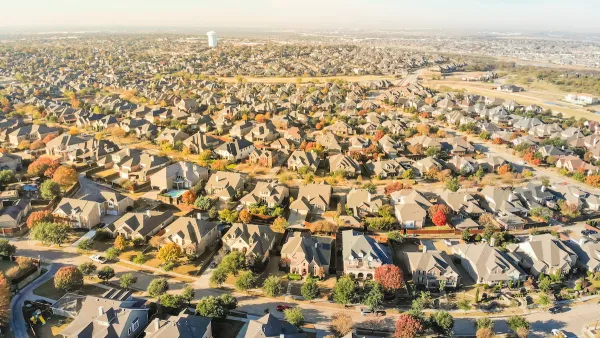The advent of sprawl coincided with a move toward earlier school start times, prompted by a need to coordinate complicated bussing. If students could walk to school, the problem might disappear.

It's hard to believe as a younger person, but before mass suburbanization school used to start at 9 a.m. or later. That isn't the case today. Mimi Kirk writes, "according to the Centers for Disease Control and Prevention, at least 75 percent of schools surveyed in more than 40 states for a 2015 report started before 8:30 a.m., with a significant number starting in the 7 a.m. hour."
Why the change? Kirk traces it to the 1960s and 1970s, when sprawl began to make walking to school difficult. Cultural changes around childrearing also discouraged walking. The result, a tiered bus schedule, imposed early start times for high schoolers. As driving became the norm, so did an early start.
Kirk discusses how the 7:30 a.m. start may cut into young people's sleep needs. "That research, which recently led both the CDC and the American Academy of Pediatrics to urge later start times at American schools, shows that teenagers need at least nine hours of sleep a night."
A movement to push back school start times is picking up speed, but faces its share of debate. Long-term, a common sense solution to the problem would be to re-enable walks to school. But that would require walkable communities, and encouraging those can be an uphill climb both ways.
FULL STORY: Suburban Sprawl Stole Your Kids' Sleep

Analysis: Cybertruck Fatality Rate Far Exceeds That of Ford Pinto
The Tesla Cybertruck was recalled seven times last year.

National Parks Layoffs Will Cause Communities to Lose Billions
Thousands of essential park workers were laid off this week, just before the busy spring break season.

Retro-silient?: America’s First “Eco-burb,” The Woodlands Turns 50
A master-planned community north of Houston offers lessons on green infrastructure and resilient design, but falls short of its founder’s lofty affordability and walkability goals.

Test News Post 1
This is a summary

Analysis: Cybertruck Fatality Rate Far Exceeds That of Ford Pinto
The Tesla Cybertruck was recalled seven times last year.

Test News Headline 46
Test for the image on the front page.
Urban Design for Planners 1: Software Tools
This six-course series explores essential urban design concepts using open source software and equips planners with the tools they need to participate fully in the urban design process.
Planning for Universal Design
Learn the tools for implementing Universal Design in planning regulations.
EMC Planning Group, Inc.
Planetizen
Planetizen
Mpact (formerly Rail~Volution)
Great Falls Development Authority, Inc.
HUDs Office of Policy Development and Research
NYU Wagner Graduate School of Public Service




























